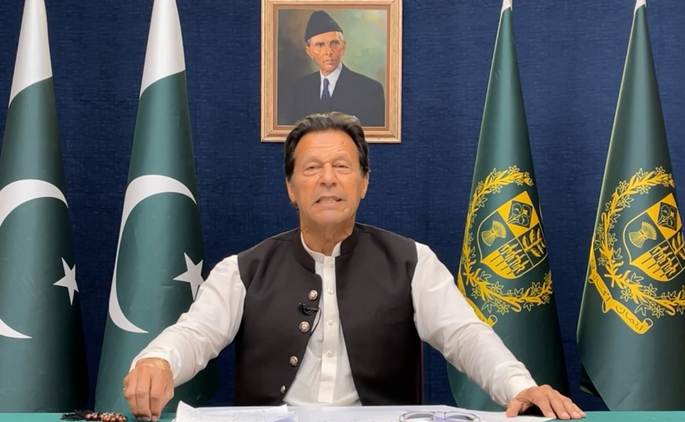Islamabad (Web Desk): Prime Minister Imran Khan on Thursday addressed the nation days ahead of voting on a no-confidence motion against him in the National Assembly that will decide his fate.
In his televised address to the nation, the premier said it will be decided on Sunday whether the nation will pursue an independent foreign policy or tow the policy of slavery.
PM Imran said that he will not resign and fight till the last ball so that people, who do not want independent policy in Pakistan can be exposed before the entire nation.
Talking about a foreign communication, encompassing threats to his government, Imran Khan expressed the determination that he will never let the foreign conspiracy succeed to undermine Pakistan's sovereignty and independence.
"The entire nation will witness that who are going to sell their conscience on Sunday, which is the voting day on the no-confidence motion against me," the premier said, adding that these sold-out souls should keep it in mind that the people of Pakistan will never forgive them for betraying the nation.
Referring to opposition leaders including Opposition Leader in the National Assembly and Pakistan Muslim League-Nawaz (PML-N) President Shehbaz Sharif, Pakistan Peoples Party (PPP) co-chairman Asif Ali Zardari and Jamiat Ulema-e-Islam-Fazl (JUI-F) chief Maulana Fazlur Rehman, PM Imran said that some stooges are trying to compromise country's interest and to appease foreign forces for their personal agenda.
"A country's credibility is on stake if it does not pursue an independent foreign policy,". Khan said.
He questioned how foreign country can dictate an independent and sovereign nation to pursue a particular policy.
"From the day one, I have been saying that Pakistan's foreign policy will be people centric," Imran Khan said, adding that pursuing an independent foreign policy does not mean that we want an enmity with anyone country or nation.
Mentioning the dictates in the foreign communication, he said it is an official document, which entails that the no-confidence motion should be successful to oust Imran Khan; otherwise there will be difficulties for Pakistan.
He added that the foreign communication even carries worst threats he has mentioned so far.
"No independent country can tolerate such kind of threats," PM Imran said.
The premier accused that opposition leaders were directly involved in this conspiracy aimed at undermining Pakistan's sovereignty.
He said these leaders are convicted from the courts and fully doused in corruption to the core and how a civilised nation can let them lead the people.
Earlier in the day, the National Security Committee (NSC) while calling the communication of a foreign country’s senior official a “blatant interference” in the internal affairs of Pakistan, decided that Pakistan would issue a strong demarche to the country in question.
According to details, the 37th meeting of the NSC which met in the federal capital under the chair of Prime Minister Imran Khan decided that the demarche would be issued both in Islamabad and in the country’s capital through proper channel in keeping with the diplomatic norms.
The meeting was attended by federal ministers of defence, energy, information & broadcasting, interior, finance, human rights, planning, development & special initiatives, chairman joint chiefs of staff committee, services chiefs, the national security adviser and senior officers.
The National Security Adviser briefed the Committee on the “formal communication” of a senior official of a foreign country to Pakistan’s Ambassador in the said country in a formal meeting, which was duly conveyed by the Ambassador to the Ministry of Foreign Affairs.
“The Committee expressed grave concern at the communication, terming the language used by the foreign official as undiplomatic,” said a PM Office press release.
The Committee concluded that the communication amounted to blatant interference in the internal affairs of Pakistan by the country in question, which was unacceptable under any circumstances.
The participants also endorsed the Cabinet’s decision in the special cabinet meeting held on 30th March, 2022 under the prime minister’s chairmanship to take the parliament into confidence through an in-camera briefing of the National Security Committee of the parliament.
The meeting was attended by federal ministers of defence, energy, information & broadcasting, interior, finance, human rights, planning, development & special initiatives, chairman joint chiefs of staff committee, services chiefs, the national security adviser and senior officers.
The National Security Adviser briefed the Committee on the “formal communication” of a senior official of a foreign country to Pakistan’s Ambassador in the said country in a formal meeting, which was duly conveyed by the Ambassador to the Ministry of Foreign Affairs.
“The Committee expressed grave concern at the communication, terming the language used by the foreign official as undiplomatic,” said a PM Office press release.
The Committee concluded that the communication amounted to blatant interference in the internal affairs of Pakistan by the country in question, which was unacceptable under any circumstances.
The participants also endorsed the Cabinet’s decision in the special cabinet meeting held on 30th March, 2022 under the prime minister’s chairmanship to take the parliament into confidence through an in-camera briefing of the National Security Committee of the parliament.
On Monday, PM Imran shared the "threat letter" he talked of with cabinet members in an emergency meeting.
Meanwhile, Information Minister Fawad Chaudhry also invited a group of journalists to meet PM Imran Khan where selected details of the letter were shared with them.
The premier had said that a Pakistani envoy posted in a foreign country wrote the memo that he flashed on March 27 at a PTI rally and termed it "threatening".
While interacting with journalists, PM Imran said that the envoy had sent the letter to Pakistan after he met an official of a foreign country, according to sources.
The prime minister had said that the memo was shared with the military leadership and mentioned that the tone used in the cable was "threatening."


